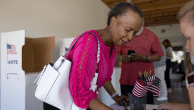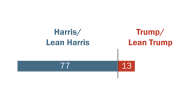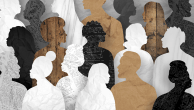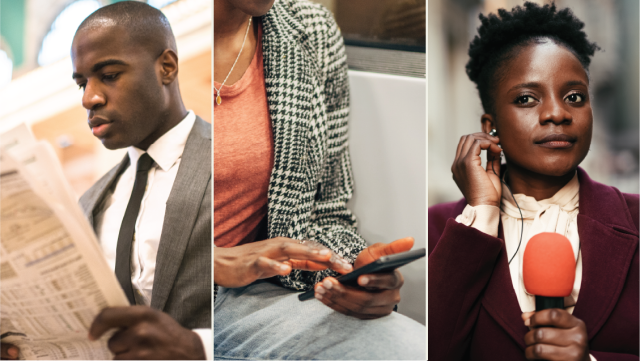
Pew Research Center conducted this study to understand Black Americans’ experiences, habits and attitudes around news and information. The main source of data for this study is a Center survey of 4,742 U.S. adults who identify as Black. Black adults include those who say their race is Black alone and non-Hispanic, Black and at least one other race and non-Hispanic, or Black and Hispanic.
The survey was conducted online from Feb. 22 to March 5, 2023, among a sample of U.S. Black adults. This sample included 1,745 respondents from Pew Research Center’s American Trends Panel (ATP) and an additional 2,997 respondents from Ipsos’ KnowledgePanel (KP). The ATP and KP are both online survey panels recruited through national, random sampling of residential addresses. This way nearly all U.S. adults have a chance of selection. This survey was administered only to adults who identified as Black and was weighted to be representative of the U.S. Black adult population by gender, age, ethnicity, partisan affiliation, education and other categories.
Here are the questions used for this report, along with responses, and its methodology.
The report also draws on a series of nine Pew Research Center focus groups conducted virtually and facilitated by PSB Insights in July and August 2022. The primary goal of these focus groups was to inform the development of the survey. All participants identified as Black or African American, including those who also identified as Hispanic or multiracial.
The report includes a number of quotations from the focus groups to help illustrate and add nuance to the survey findings. Quotations are chosen to provide context and are not necessarily representative of the majority opinion of any group. Language may have been edited for grammar, spelling and clarity. For more information, read the methodology.
Pew Research Center is a subsidiary of The Pew Charitable Trusts, its primary funder. This is the latest report in Pew Research Center’s ongoing investigation of the state of news, information and journalism in the digital age, a research program funded by The Pew Charitable Trusts, with generous support from the John S. and James L. Knight Foundation.
Key takeaways
- Black Americans see several problems in news coverage of Black people. Most say that Black people are covered more negatively than people in other racial and ethnic groups.
- Black Democrats and Republicans, as well as Black adults across all age groups, are similarly critical of news coverage of Black people.
- Educating all journalists about issues impacting Black people and history is among the steps Black Americans say would help the situation.
- Many Black Americans say Black journalists are better at understanding them and covering issues related to race, though few see a reporter’s race as a key factor in determining the accuracy of news in general.

Black Americans see a range of problems with how Black people are covered in the news, and few are hopeful that will change in the foreseeable future, according to a new Pew Research Center survey of nearly 5,000 Black adults.
On several questions, Black Americans are far more likely to view news coverage of Black people in a negative rather than positive light:
- Almost two-thirds of Black adults (63%) say news about Black people is often more negative than news about other racial and ethnic groups; 28% say it is about equal and 7% say it is often more positive.
- 57% say the news only covers certain segments of Black communities, compared with just 9% who say it covers a wide variety of Black people.
- Half say coverage is often missing important information, while only 9% say it often reports the full story.
- 43% say the coverage largely stereotypes Black people, far higher than the 11% who say it largely does not stereotype. An additional 43% say both of these things happen about equally.
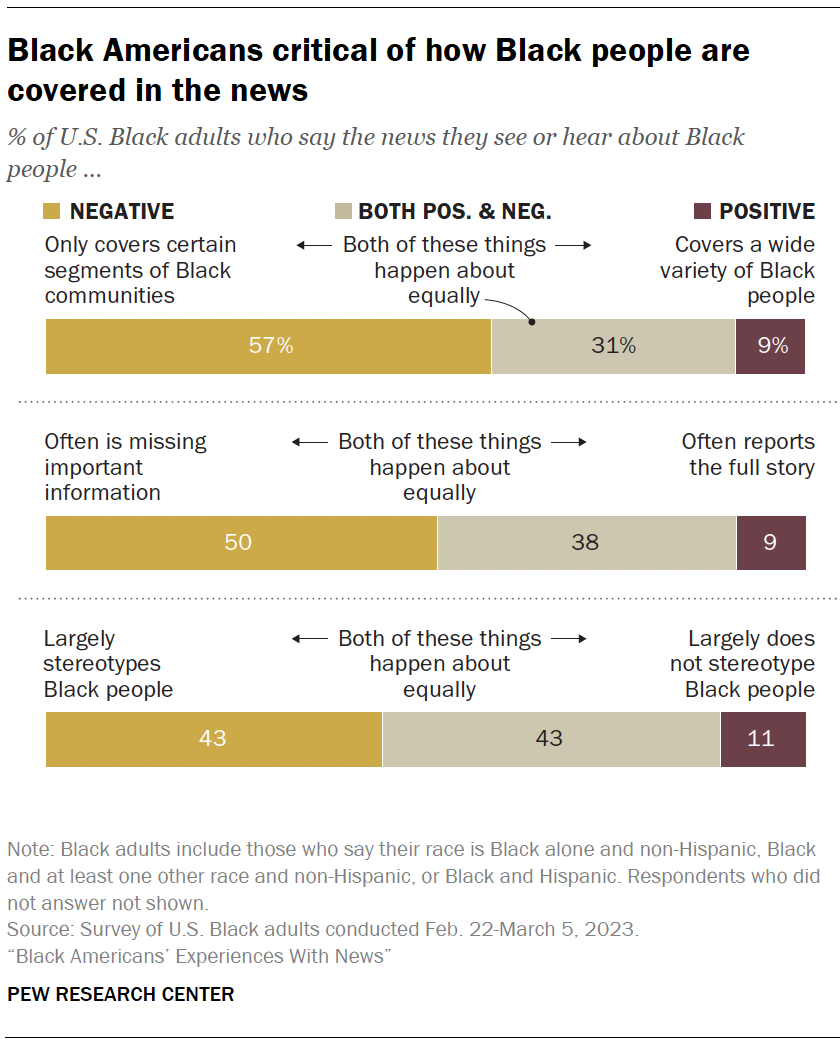
These critical views of coverage of Black people are widely shared within the Black population, regardless of age, gender and even political party affiliation.
The survey asked Black Americans if they ever come across news that is racist or racially insensitive about Black people in some way. About four-in-ten (39%) say they see this kind of racially problematic news extremely or fairly often, and an additional 41% say they sometimes see such news.
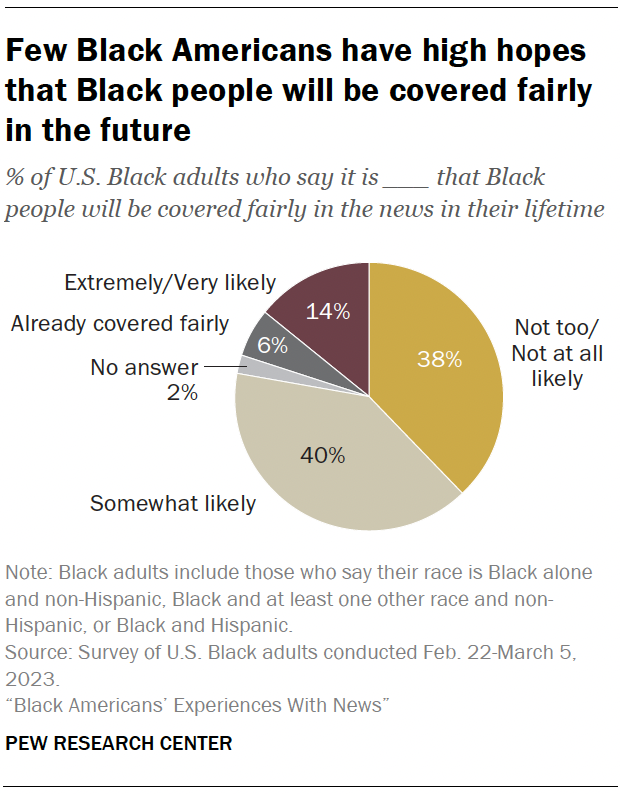
Those who report coming across racially problematic news coverage of Black people at least sometimes see a few different reasons for this. About half (51%) say outlets pushing agendas is a major factor, and 45% say the same about journalists not being informed. Others say racist views among people at the news outlet (42%), the speed of the news cycle (37%) and a lack of Black staff at the news outlet (36%) are major reasons for racist or racially insensitive coverage.
Just 14% of Black Americans are highly confident that Black people will be covered fairly in their lifetimes, saying that is extremely or very likely to happen. Far more (38%) think that is not too likely or not at all likely to happen, while an additional 40% say it is somewhat likely. (More details on Black Americans’ views of how Black people are covered in the news are in Chapter 1.)
How can news coverage of Black people improve?
Black Americans identify a few steps that could improve what they see as flawed coverage. And one factor consistently stands out – making sure that journalists are informed about the issues affecting Black people.
The survey asked about the importance of several practices for journalists when covering Black people, finding that:
- 76% of Black Americans cite coverage of all sides of an issue as extremely or very important.
- A similar percentage, 73%, say it is extremely or very important for journalists to understand the history of the issues in the story.
- A majority (59%) say journalists personally engaging with the people they cover is of high importance.
- Roughly half (48%) see having journalists advocate for Black people as extremely or very important.
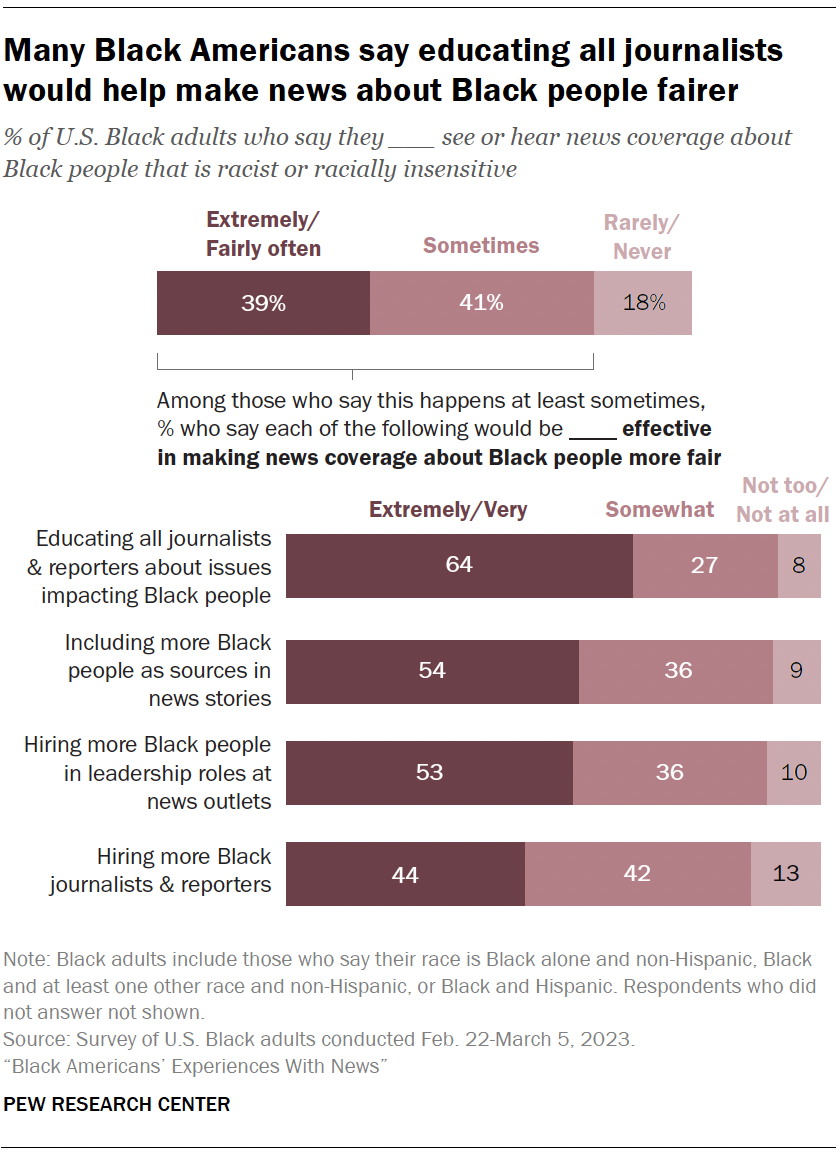
Among those who report at least sometimes seeing racist or racially insensitive coverage about Black people, nearly two-thirds (64%) identify educating all journalists about issues impacting Black Americans as an extremely or very effective way of making coverage fairer.
Substantial shares also say including more Black people as sources (54%) and hiring more Black people as newsroom leaders (53%) and as journalists (44%) at news outlets would be highly effective. Details on these findings are in Chapter 2.
These are some of the key findings of the Center’s nationally representative survey of 4,742 U.S. Black adults conducted from Feb. 22 to March 5, 2023. We undertook this study to take a closer look at the relationship between Black Americans and news in the United States.
In 1967, the Kerner Commission – undertaken by President Lyndon Johnson’s administration to investigate the causes behind urban riots – took a harsh view on the news media’s stance toward Black Americans. The commission’s report cited sensationalist and divisive coverage as well as inaccurate and unfair representations of Black communities, concluding that “the journalistic profession has been shockingly backward in seeking out, hiring and promoting” Black people, and “the press has too long basked in a white world looking out of it, if at all, with white men’s eyes and white perspective.”
More than half a century later, there is continued discussion of many of the themes raised in the report. This new study asks Black Americans themselves about their experience with news today, including views around portrayals of Black people in news stories, representation in newsrooms, and where they go and whom they trust for information.
The focus on the Black population allowed the Center to tailor the study to the experiences of Black Americans rather than comparing them to other groups. It also provided a greater opportunity to look deeply at differences and similarities among groups within the Black population.
To get a deeper understanding of Black Americans’ experiences with and views about the news, we also held a series of nine online focus groups of U.S. Black adults, enabling participants to elaborate on their views. Quotes from these participants are included throughout this report. The methodology includes more details about the survey and focus groups.
Quotes from focus groups on problems in news coverage of Black people:
“There’s not a lot of African American coverage unless it’s February or it’s criminal.” –Black woman, 60
“[News about Black people] is not accurate. They overemphasize the bad, and not some of the good things that are happening in the community, or if they do talk about the good things, it’s just a blurb and they want to focus on the one thing [that] was just terrible.” –Black woman, 55
“I feel like they make us look stupid at times … I have a feeling that any time that I see [a Black person being interviewed on the news] it’s always those people that I feel like that have a hard time speaking correctly or I guess their vocabulary is very limited. And I feel like they do that on purpose.” –Black man, 29
Views about newsroom representation
Many Black Americans see instances when it is important for the news they get to come from Black journalists – particularly in getting news related to race and racial inequality. And as noted earlier, many see hiring more Black journalists and newsroom leaders as ways to improve coverage of Black people. But few think their news in general needs to come from Black journalists, nor do they automatically trust a story because it comes from a Black journalist.
Nearly half of Black Americans think that Black journalists do a better job than other journalists at covering issues related to race and racial inequality (45%) and also at understanding them (44%). Roughly similar percentages say Black journalists do about as well as other journalists in these areas, while much smaller shares say Black journalists do a worse job (5% each).
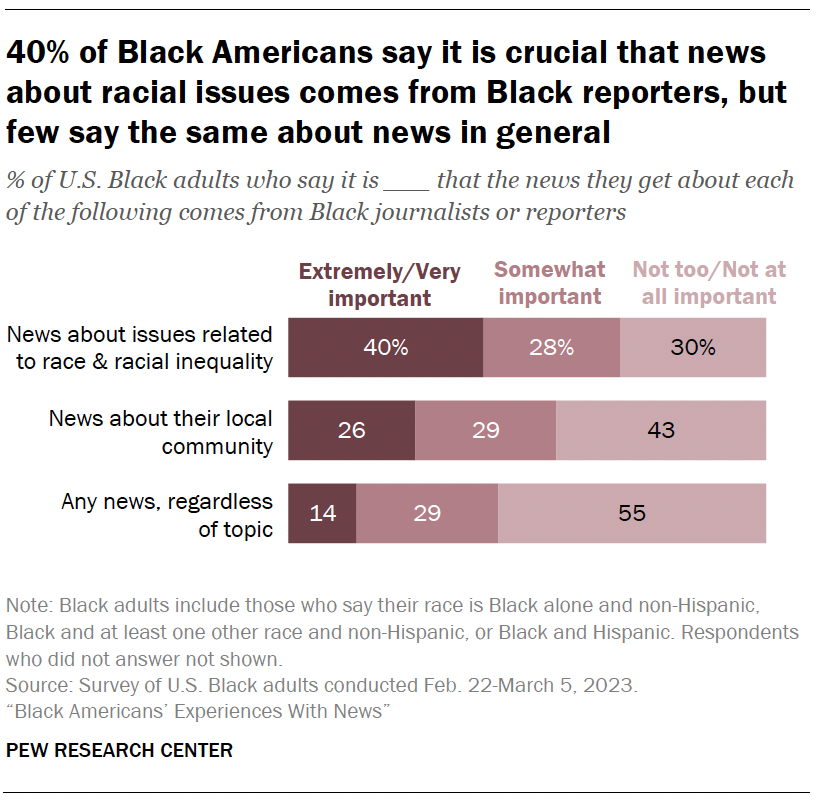
For many Black Americans, then, it is crucial that the news they get about issues related to race and racial inequality comes from Black journalists. Four-in-ten Black Americans say this is extremely or very important, and an additional 28% say it is somewhat important.
At the same time, just 14% of Black Americans say it is highly important that any news they get, regardless of topic, comes from Black journalists. And a similarly small share (17%) say Black journalists are better than other journalists at reporting the news accurately.
Black Americans take a number of factors into account when assessing the credibility of a news story – but the journalist’s race is not a dominant one. Relatively few Black adults (15%) say that a journalist being Black is an extremely or very important factor in deciding whether a story is trustworthy. That lags well behind other factors, including the sources cited (53% say this is extremely or very important in determining a story’s credibility), whether it is reported by multiple outlets (50%), and the news outlet itself (46%).
Read Chapter 3 for detailed views on newsroom representation.
Quotes from focus groups on the importance of getting news from Black journalists:
“I always love seeing Black journalists do their thing, but I can get the news from any source, to be honest. It doesn’t have to be a Black person delivering me the news. … The news is the news regardless of who delivers it. … Certain topics you kind of want that perspective of [a Black journalist]. A traffic accident, you got that, but then if it’s something more involved like a racial incident I wanna see a Black perspective of it.” –Black man, 61
“In our local newspaper, like I said, I don’t trust it and there are definitely not Black writers employed with that newspaper. … If they were hiring Black people then that would tell me something more about the newspaper itself and their sort of values, so I don’t have that.” –Black woman, 40
Similarities and differences within the Black population
Concerns about how Black people are covered in the news are widespread across the Black population. For example, Black adults across age groups largely see coverage in a far more negative than positive light, and Black men and women view issues around Black news coverage in very similar ways. There are some differences by education, with Black adults who have more formal education expressing more negative opinions about news coverage of Black people.
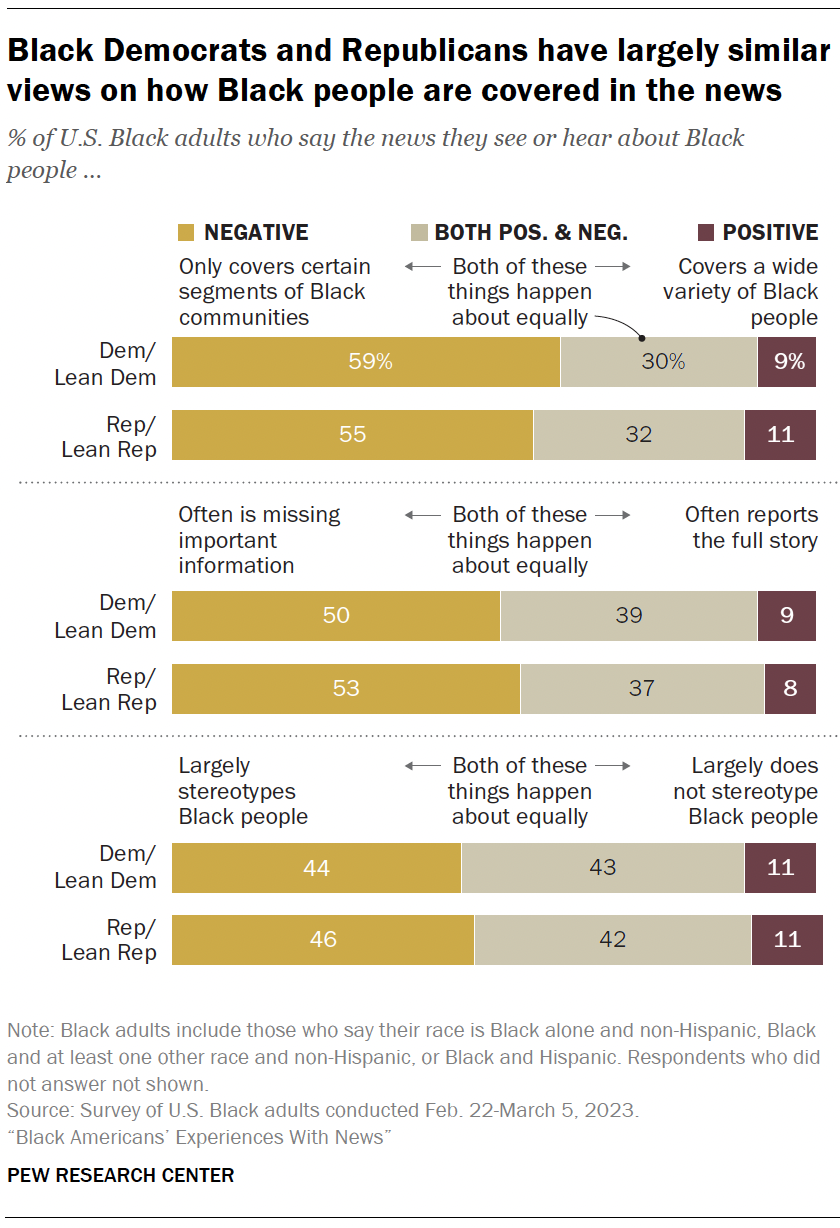
But the consensus extends to two groups that typically agree on very little when it comes to views of the news media – Democrats and Republicans. While Republicans in general tend to be much more skeptical of journalists, Black members of the two party coalitions are largely in agreement on identifying problems in news coverage of Black people:
- Among Black Democrats and those who lean Democratic, 59% say news about Black people covers only certain segments of Black communities, along with 55% of Black Republicans and Republican leaners. Much smaller shares in both groups say the news covers a wide variety of Black people (9% and 11%, respectively).
- 53% of Black Republicans say coverage is often missing important information, as do 50% of Black Democrats. Far fewer (8% and 9%) say the news often reports the full story.
- And 46% of Black Republicans say coverage largely stereotypes Black people, virtually identical to the 44% of Democrats who say the same. Just 11% in each group take the positive view that the news largely does not stereotype Black people.
Views about the news media broadly are more reflective of the overall partisan divide on this issue, with Republicans consistently less trusting of journalists. Nearly half of Black Democrats (48%) have a great deal or fair amount of trust in national news outlets, compared with 32% of Black Republicans. The gap is similar – 52% vs. 37% – on trust in local news outlets. (Read Chapter 5 for more on where Black Americans go and whom they trust for news and information.)
There is a large amount of consensus across different age groups about shortcomings in how Black people are covered. And low percentages across all age groups – including the youngest (ages 18 to 29) and the oldest (65 and older) – say it is highly likely that Black people will be covered more fairly in their lifetimes.
Across education and income levels, however, Black adults are less in agreement about news coverage of Black people. While these groups are much more negative than positive in their views of news coverage of Black people, those with more formal education and higher incomes tend to be particularly negative.
- Roughly two-thirds of Black Americans with at least a bachelor’s degree (68%) say news they see or hear about Black people covers only certain segments of Black communities, versus 49% of those with a high school diploma or less education.
- Three-quarters of Black Americans with the highest income level (75%) say news coverage of Black people is often more negative than about other racial and ethnic groups, versus 57% of those in the lowest income group.
Differences also emerge within the Black population in views about the role of Black journalists in how people get news. Black Democrats, younger adults, and those with higher levels of education and income often see greater value in getting news from Black journalists.
- 54% of Black adults ages 18 to 29 say Black journalists are better than other journalists at covering issues related to race or racial inequality, versus 37% of those 65 and older.
- 54% of Black adults with at least a bachelor’s degree say Black journalists are better at understanding them, compared with 35% of those who have a high school diploma or less.
The importance of Black identity in views about the news
Some of the largest differences within the Black population are based on their sense of Black identity – how important being Black is to how they think about themselves. On a number of issues, wide gaps emerge between Black Americans who say their racial identity is extremely or very important to them and those who say it is less important.
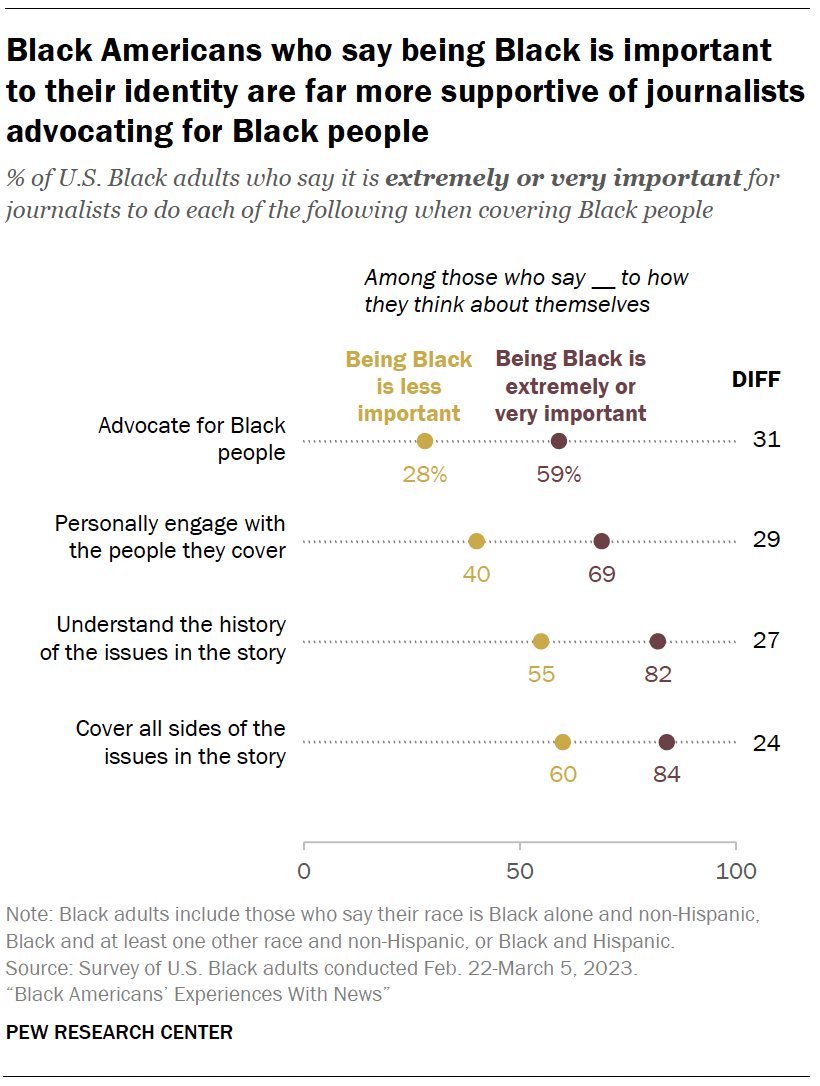
One example of this divide involves views about what journalists should do when covering Black people. The vast majority of those who say being Black is highly important to their identity (82%) say it is extremely or very important for journalists to understand the history of the issues in the story when covering Black people. That number falls to 55% among those who say being Black is less important to them (i.e., it’s somewhat, a little or not at all important).
Similarly large differences exist between the two groups over whether journalists should personally engage with the people they cover (69% vs. 40%) and whether they should advocate for Black people (59% vs. 28%). And the same pattern applies to questions about the role of Black journalists: Those who say being Black is highly important to how they think about themselves are more likely to value the impact of Black reporters (read Chapter 4 for details).
Sources of news and information
As with the public broadly, Black Americans stay informed about current issues and events through a range of sources. At least a third of Black Americans say they get news extremely or fairly often from local news outlets, national news outlets, social media sites, and friends, family or acquaintances. Large majorities get news from each of these sources at least sometimes.
In addition, about a quarter of Black Americans (24%) say they get news from Black news outlets extremely or fairly often, with another 40% saying they do so sometimes. In the survey, Black news outlets were defined as outlets created by Black people that focus on providing news and information specifically for Black audiences.
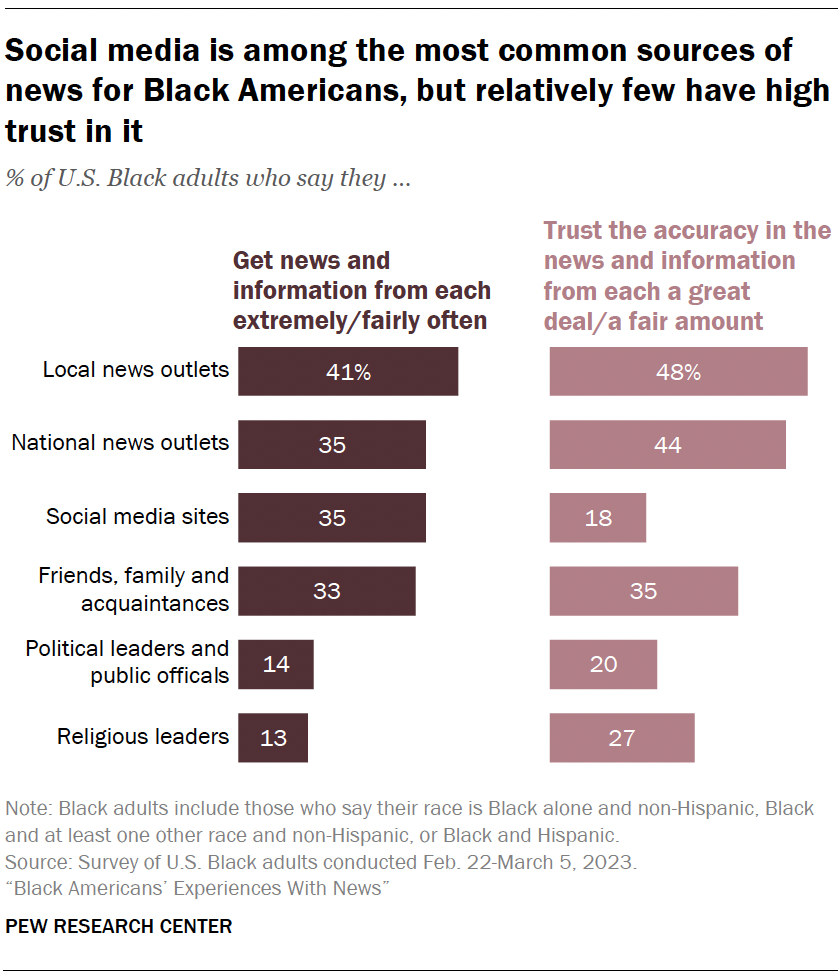
Social media may be one of the most common ways that Black Americans stay informed, but Black Americans do not trust the news they get there as much as many other types of sources – a pattern similar to views among the broader U.S. population. About one-in-five (18%) say they have a great deal or fair amount of trust in the accuracy of the information from social media, far smaller than the shares who say the same about local and national news outlets (48% and 44%, respectively).
Black Americans who at least sometimes get news on social media are more likely to say they prefer news outlets over social media for several specific types of information, including basic facts or in-depth information about an issue or event (details are in Chapter 5).


